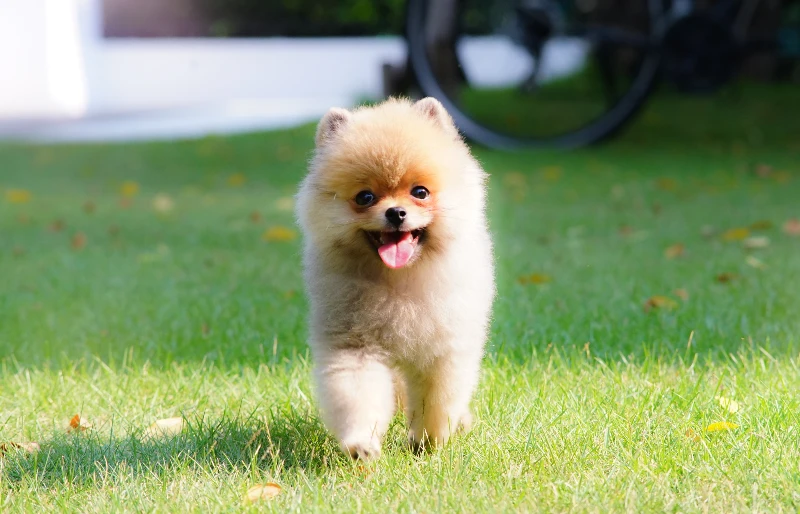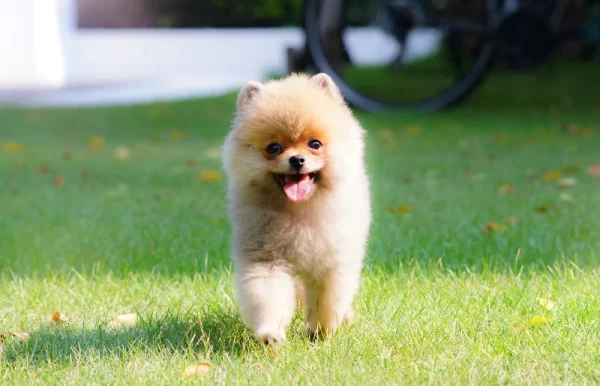Pomeranians are small, fluffy balls of joy and excitement that require plenty of daily physical activity. They love to play fetch, run around the park, and tend to get overly excited when you come home from work. All these moments are delightful and innocent, usually accompanied by panting and jumping around.
If you are wondering why your Pomeranian is panting so much and so often—don’t worry! Panting is usually a completely normal response to your dog’s excitement or happens due to environmental factors.
Check out our list of several common reasons behind your dog’s panting and times at which panting can become worrying.
Top 6 Reasons Why Your Pomeranian Is Panting So Much
1. Overheating
The most common reason dogs, including Pomeranians, pant is to cool themselves down. For an active dog, especially during hot summer days, panting is normal, and it can indicate that your dog is trying to release heat. This is especially true for dogs with thick coats, such as Pomeranians. Since this breed originated in the Arctic region, its dense coat helps the Pomeranian retain its body temperature. Panting is a way for the dog to inhale and exhale rapidly, causing more water to evaporate from its nose and lungs. This process cools the dog’s body from the inside.
Overheating is the stage before heatstroke1. To prevent your Pomeranian from developing heatstroke or becoming dehydrated, avoid walking or hiking during high temperatures, always seek shade, provide your dog with plenty of water, and never leave your dog in a hot car.
2. Excitement
When Pomeranians are excessively happy or excited about something, they will be more active than usual. This behavior is entirely normal in certain situations, such as when the dog plays outside, gets treats, or when you arrive home. You’ll easily recognize this type of pant as it is usually accompanied by a soft whine and jumping or running around.
While this behavior is nothing to worry about, it is not recommended to encourage your dog to get overly excited when you arrive home. It is best to remedy this behavior by greeting your dog only when it calms down.
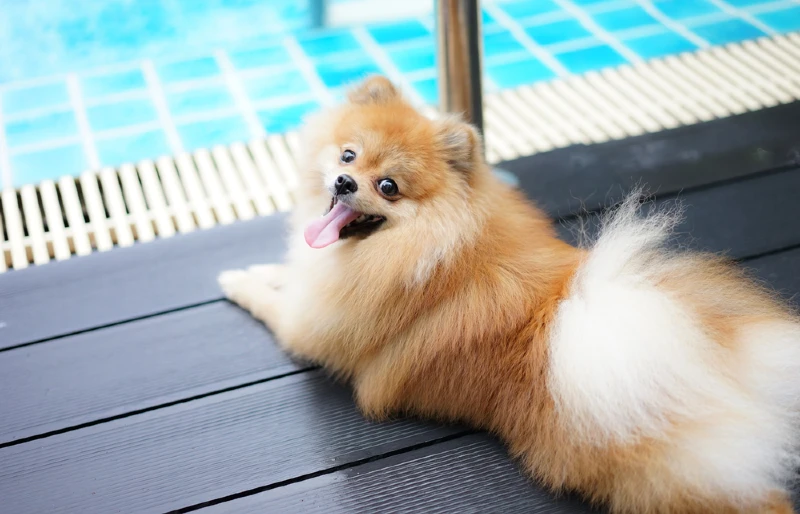
3. Stress
Similar to panting due to positive excitement, dogs also tend to pant when stressed about something. When a dog feels stressed or anxious, their system releases adrenalin, raising the heart and respiratory rate and causing them to start panting.
Your dog’s stress and excitement can sometimes seem the same, although there will be micro changes in the behavior that can indicate a particular situation making your dog anxious. You may notice your dog yawning, drooling, shaking, hiding, or looking away; these symptoms, followed by panting, can indicate stress in your dog. In these moments, observing your Pomeranian and understanding their body language is crucial.
4. Pain and Fear
If you notice your dog is panting when there are no outside stimuli to excite him, the cause might be fear or pain. If you know your dog has some type of illness that may cause them pain, that may be the cause of the panting. Your dog may also get scared if they sense a storm coming or hear strange noises, which will cause their bodies to produce cortisol. Cortisol is a hormone that regulates your dog’s stress response, along with other functions. When your dog feels fear, anxiety, stress, or pain, the cortisol levels will rise and your dog will start panting.
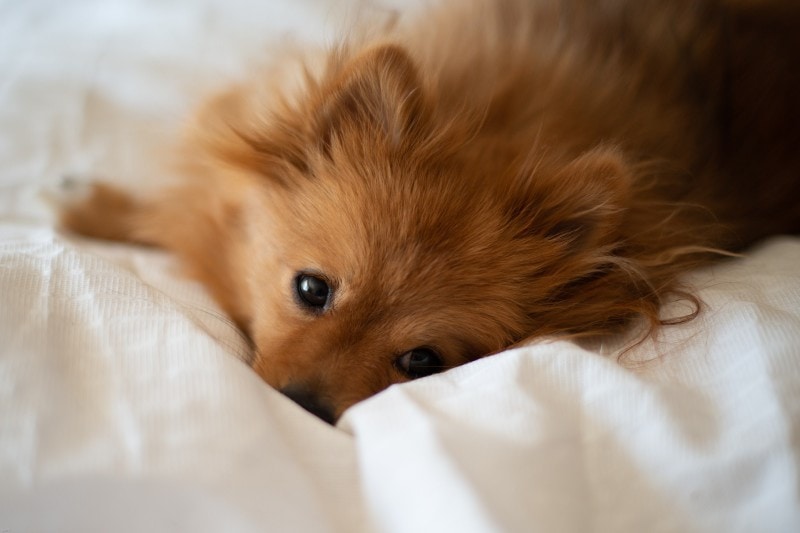
5. Fever
Your Pomeranian could be panting because their body temperature has increased due to fever. Dogs can get fever if they suffer from infectious diseases, inflammation, immune-mediated problems or cancer. Your vet will know which tests to perform to understand your Pomeranian’s high temperature.
6. Disease or Illness
In some cases, panting is not a normal response to the outside world but is the result of an underlying condition or illness. Chronic illnesses such as Cushing’s syndrome can raise the levels of Cortisol in the body, causing panting and many other symptoms. Heart issues or respiratory disorders can also be the cause of panting, while obese dogs are more prone to exhibit this behavior. Flat-faced dogs with breathing problems also exhibit panting as a usual symptom of shortness of breath. These dogs tend to pant even when resting, which is not a matter of concern, although a healthy weight can significantly enhance their quality of life.
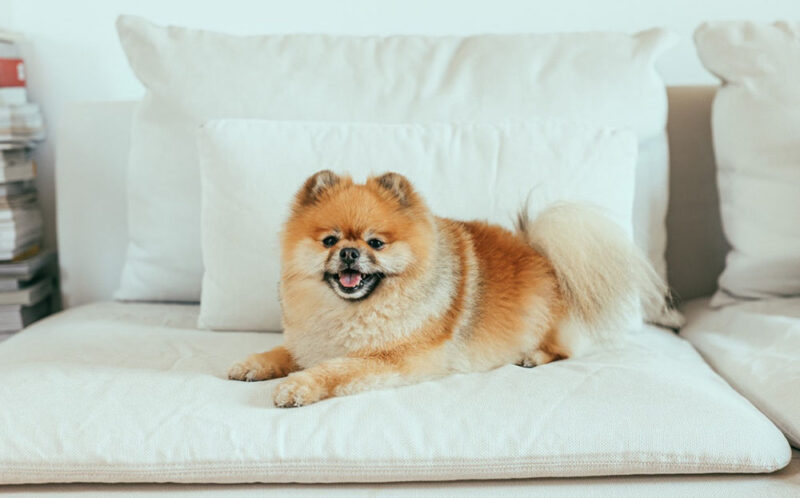
When To See a Vet
Since panting is usually a normal response to heat, excitement, happiness, and physical activity, it is essential to differentiate these non-threatening situations from harmful ones. Several symptoms will follow the panting of your Pomeranian, which can indicate a bigger, more severe condition.
- Intense panting that starts suddenly
- Your dog is panting even when resting
- Your dog’s tongue or gums change color to bright pink, red, blue or purple
- The panting is followed by diarrhea or vomiting
- Your dog is weak or lethargic
- Foaming at the mouth
In Conclusion
Hopefully, this article will help many Pomeranian parents learn the reasons behind their dog’s most common behavior. Panting is nothing to worry about under normal circumstances, although it can cause worry when your dog exhibits other symptoms alongside it. Next time your Pomeranian begins panting suddenly and intensely, look out for other symptoms, such as vomiting, confusion, and discolored gums, as it can indicate an underlying issue.
Featured Image Credit: Jen Ottepka, Shutterstock

